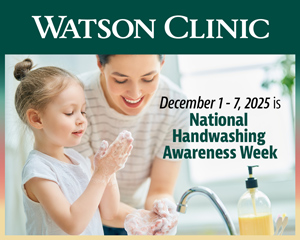 Shaking hands. Lending a hand. Holding hands. Our hands are just right for all kinds of wholesome activities. Unfortunately, they're also very good at spreading germs.
Shaking hands. Lending a hand. Holding hands. Our hands are just right for all kinds of wholesome activities. Unfortunately, they're also very good at spreading germs.
That's why proper handwashing is so important.
In addition to other preventive measures, the Centers for Disease Control and Prevention recommends that people wash their hands often to help stop the spread of infectious diseases.
Washing your hands the right way involves more than a small dab of soap and a quick rinse under the faucet.
Here's how to do it right:
• Get your hands wet and soapy. Use clean, running water—either cold or warm.
• Rub hands together and scrub every surface. Don't forget the backs of your hands, between your fingers and under your nails.
• Continue rubbing for at least 20 seconds and then rinse with running water.
• Dry off with a clean towel or, if none is available, just let your hands air-dry.
Practice proper handwashing often. It's especially important to wash before and after handling food and before and after caring for someone who is sick or injured.
Also, wash up after blowing your nose, coughing or sneezing; using the toilet or changing a diaper; handling an animal, pet food or animal waste; or touching garbage.
If there's no soap or water, it's OK to use an alcohol-based hand sanitizer. Be sure it contains at least 60% alcohol.
Sanitizers have limitations, though. They won't kill all the germs, and they may not be as effective when hands are visibly dirty. So when you have the option, choose soap and water.
For additional tips on how you can prevent the spread of germs and infection, schedule an appointment with a member of our
Family Medicine or
Internal Medicine departments by calling 863-680-7190.